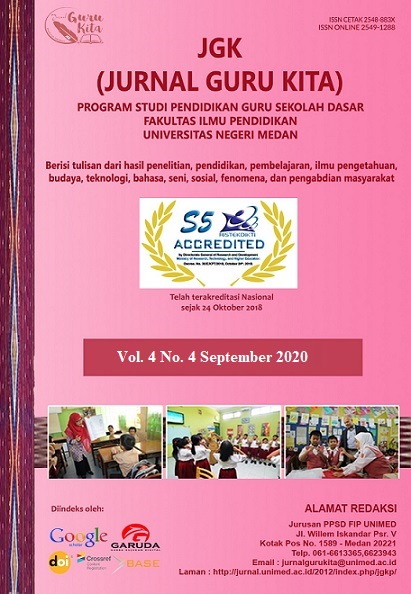MENINGKATKAN KOMPETENSI GURU PADA MASA PANDEMI COVID-19 MELALUI STRATEGI KEPALA SEKOLAH DI SMP NEGERI 45 MEDAN TAHUN AJARAN 2021/2022
DOI:
https://doi.org/10.24114/jgk.v6i2.42004Keywords:
Teacher Competence, Covid-19 Pandemic, Principal's Strategy.Abstract
Improving Teacher Competence During the Covid-19 Pandemic Through the Principal's Strategy at SMP Negeri 45 Medan for the 2021/2022 Academic Year. The purpose of school action research is to find out the principal's strategy in increasing teacher competency during the Covid-19 pandemic at SMP Negeri 45 Medan, Labuhan District. The research method is descriptive qualitative research, the subjects in this study were teachers at SMP Negeri 45 Medan, Labuhan District, the data collection techniques were: observation techniques, interview techniques and documentation studies. The results of this study are: 1) There are 3 strategies for increasing teacher competence during the pandemic. First, coaching teachers by learning to use Google Classroom during a pandemic. Second, directives, namely sending links to seminars, workshops, training and others so that teachers can follow them. Third, education and training, namely increasing the competence and professionalism and quality of teachers. 2) Supporting and inhibiting factors in increasing teacher competence during a pandemic are: supporting factors, a) Discipline, by arriving on time to school, b) Providing motivation, by giving advice during meetings and outside meetings to attract teachers' enthusiasm, c) Awards, in the form of opportunities to take part in competency improvement training and the awarding of certificates. The inhibiting factors are, a) The teacher's indifference to their performance, so that the teacher teaches subjects that are not in accordance with their qualifications, b) the lack of teachers mastering IT, so that the teacher has difficulty operating the technological media used in online training and online learning. It is recommended that teachers can further improve their competence by participating in competency improvement training and also increase their enthusiasm and enthusiasm to develop and improve their own competence.References
Aida Nirwana, Murniati, Yusrizal, 2015. œStrategi Kepala Sekolah Dalam Meningkatkan Kompetensi Profesional Guru Pada SD Negeri 2 Kota Banda Aceh, Jurnal Administrasi Pendidikan Pasca Sarjana universitas Syiah Kuala.
Ambar Sari, Desy Eka, œUpaya Kepala Sekolah dalam Meningkatkan Kompetensi Guru di SDN Klino 2 Kecamatan Sekar Kabupaten Bojonegoro, Jurnal Pendidikan Islam, Vol. 4, No. 1, 2015, 3.
Andi Prastowo, 2017. Memahami Metode-Metode Penelitian: Suatu tinjauan teoritis dan Praksis, Jogjakarta: Ar-Ruzz Media.
Badan Pengembangan Dan Pembinan Bahasa, Kamus Besar Bahasa Indonesia, Jakarta: Balai Pustaka, 2005.
Bafadal, Ibrahim, 2003. Manajemen Peningkatan Mutu Sekolah Dasar dari Sentralisasi Menuju Desentralisasi, Jakarta: Bumi Aksara.
E Mulyasa, 2004 Menjadi Kepala Sekolah Profesional, Bandung: Pt remaja Rosdakarya.
Eka Prihatin, 2014. Manajemen peserta didik, Bandung: Alfabeta.
Fathor Rahman, 2017. œKompetensi Pedagogik, Profesional, Kepribadian dan Kompetensi Sosial dosen, Jurnal Akademik Sekolah Tinggi Ilmu Ekonomi ASIA Malang,
Freed R, David, 2006 Manajemen Strategi, Jakarta:Salemba Empat.
Hamzah B. Uno. 2016. Tugas Guru Dalam Pembelajaran: Aspek yang Memengaruhi, Jakarta: PT Bumi Aksara, 2016.
Huberman dan John Saldana, Miles, 2014. Qualitative Data Analysis A Methods Sourcebook Edition 3, USA: Sage Publivation.
Imron Fauzi, 2018. Etika Profesi Keguruan, Jember: IAIN Jember Press.
Kurniawan Saefullah, Erni tisnawati, 2009 Pengantar Manajemen, jakarta: kencana prenara.
Linda Sari Rambe, 2018. œStrategi Kepemimpinan Kepala Madrasah dalam Meningkatkan Kualitas Pembelajaran di MTs Negeri 2 Rantauprapat dalam skripsi, (Medan: Prodi Manajemen Pendidikan Islam Fakultas Ilmu Tarbiyah Dan Keguruan Universitas Islam Negeri Medan),
M. Hasyim, Penerapan Fungsi Guru dalam Proses Pembelajaran, Jurnal Auladana (Fakultas Tarbiyah da Keguruan Universitas Aulauddin Makasar), Vol. 1, No. 2, 2014.
Nur Nasution, Wahyudin, Kepemimpinan pendidikan disekolah, Jurnal tarbiyah, (Dosen Fakultas Ilmu Tarbiyah dan Keguruan UIN SU Medan), vol. 22, No 01, 2015.
Nurtanio Agus Purwanto, 2019. Kepemimpinan Pendidikan, Yogyakarta: Interlude,
Peraturan Menteri pendidikan dan Kebudayaan Republik Indonesia Nomor 6 Tahun 2018 tentang penugasan guru sebagai kepala sekolah.
Peraturan Menteri Pendidikan Nasional Nomor 13 Tahun 2007 tentang Standar Kepala Sekolah/Madrasah.
Peraturan Menteri Pendidikan Nasional Republik Indonesia nomor 6 tahun 2018 tentang penugasan guru sebagai kepala sekolah.
Peraturan Republik Indonesia No 19 Tahun 2005 Tentang Guru dan Dosen.
Purwanto, M.Ngalim, 2006. Administrasi dan Supervisi Pendidikan, Bandung: PT Remaja Rosdakarya.
Saroni, Muhammad, 2017. Analisis dan Strategi Meningkatkan Daya Saing Sekolah, Jogjakarta: Ar-Ruzz Media.
Sugiyono, 2020. Metode Penelitian Kualitatiff(untuk penelitian yang bersifat: eksploratif,enterpretif, dan konstruktif), bandung: Alfabeta.
Suharsimi Arikunto, 2010. Manajemen Pengajaran Secara Manusiawi, Jakarta: Rineka.
Undang-Undang Republik Indonesia, No. 14 Tahun 2008. Tentang Guru dan Dosen
Undang-Undang Republik Indonesia Nomor 20 Tahun 2003. Tentang Sistem Pendidikan Nasional.
Downloads
Published
How to Cite
Issue
Section
License
Authors published with the JGK (Jurnal Guru Kita) agree to the following terms:
- Authors retain copyright and grant the journal the right of first publication with the work simultaneously licensed under a Creative Commons Attribution License (CC BY-SA 4.0) that allows others to share the work with an acknowledgment of the work's authorship and initial publication in this journal.
- Authors are able to enter into separate, additional contractual arrangements for the non-exclusive distribution of the journal's published version of the work (e.g., post it to an institutional repository or publish it in a book), with an acknowledgment of its initial publication in this journal.
- Authors are permitted and encouraged to post their work online (e.g., in institutional repositories or on their website) prior to and during the submission process, as it can lead to productive exchanges, as well as earlier and greater citation of published work. (See The Effect of Open Access)




























